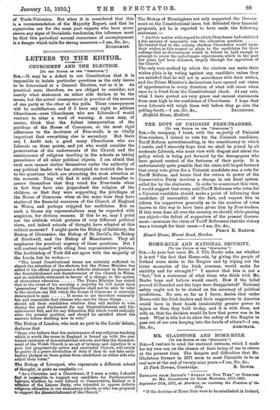LETTERS TO THE EDITOR.
CHURCHMEN AND THE ELECTION. [To THE EIWTOR Of TER " SPIICTITOR.'1 SIR,—It may be a defect in our Constitution that it is impossible to isolate particular questions as the only issues
to be determined at a General Election, but so it is. As practical men, therefore, we are obliged to consider, not merely what statesmen on either side declare to be the issues, but the actual consequences in practice of the success of one party or the other at the polls. These consequences will be multifarious, and if I have any right to address Churchmen—even Churchmen who are Liberals—I would venture to utter a word of warning. A man may, of course, think that the fullest interpretation of the privilege of the House of Commons, or the most rigid adherence to the doctrines of Free-trade, is so vitally important that everything else is secondary. But there are, I doubt not, a good many Churchmen who are Liberals on these points, and yet who would consider the preservation of the endowments of the Church and the
maintenance of religious teaching in the schools as taking precedence of all other political objects. I am afraid that such men cannot shelter themselves under the authority of
any political leader who has attempted to restrict the issue to the questions which are attracting the most attention at the moment. They will find it cold comfort hereafter to assure themselves that they voted for Free-trade when in fact they have also jeopardised the religion of the children, or that they were supporting the privileges of the House of Commons when at the same time they have shattered the financial resources of the Church of England in Wales, and perhaps crippled her usefulness. But on such a theme my representations may be regarded with suspicion, for obvious reasons. If this be so, may I point out the attitude which prelates of very different political views, and indeed schools of thought, have adopted at this
critical moment P I might quote the Bishop of Salisbury, the Bishop of Gloucester, the Bishop of St. David's, the Bishop of Southwell, and the Bishop of Manchester. They all
emphasise the practical urgency of these questions. But I will content myself with citing four representative prelates.
The Archbishop of York did not agree with the majority of the Lords, but he writes :— " The broad Constitutional issues are certainly sufficient to absorb the attention of the electors, but the Prime Minister has added to his official programme a definite statement in favour of the disestablishment and disendowment of the Church in Wales, and an indefinite statement in favour of a change in the system of elementary education The Prime Minister has stated that in the event of his securing a majority he will insist upon 'guarantees' that the Second Chamber shall not be able to refer to the electors any Bill which the House of Commons is seriously determined to pass. . . . . . It seems to me therefore eminently
fair and reasonable that citizens who care for these things should ask their candidates whether they will decline to vote during the next Parliament for any Disestablishment and Dis- endowment Bill, and for any Education Bill which would radically alter the present position, and should be satisfied about the answers before deciding how to vote."
The Bishop of London, who took no part in the Lords' debate, declares that "those who believe that the maintenance of any religious teaching which is worth the name in England is bound up with the con- tinued existence of denominational schools, and that the disendow- ment of the Welsh Church is an act of tyranny and injustice to a poor but progressively active and successful Church, will surely be guilty of a grave dereliction of duty if they do not take satis- factory pledges on these points from candidates on either side who solicit their votes."
The Bishop of Liverpool, who represents a different school of thought, is quite as emphatic :—
" As a Christian and a Churchman, if I were a voter, I should find it impossible- to support any candidate for Parliamentary Naours, whether he wore Liberal or Conservative, Radical or a mImber of the Labour Party, who intended to oppose definite religious edireation in our elementary schools, or who was prepared to support the disestablishment of the Church." The Bishop of Birmingham not only supported the Govern- ment on the Constitutional issue, but defended their financial proposals, yet he is reported to have made the following statement :— " Another matter with regard to which Churchmen had exhibited
a fair amount of unanimity was tho education question He trusted that in the corm g election Churchmen would make their wishes in this respect so plain to the candidates for their suffrage that no Government would in future be bold enough to attempt to renew tho unfortunate experiments which in the past few years had been defeated, largely through the opposition of the Church."
The only sure method by which the electors can make their wishes plain is by voting against any candidate unless they are satisfied that he will act in accordance with their wishes, and the Prime Minister's declarations have opened out vistas of apprehension in every direction of what will occur when once he is freed from the Constitutional check. At any rate, what I have quoted are very grave and earnest statements from men high in the confidence of Churchmen. I hope that even Liberals will weigh them well before they go into the
polling-booth.—I am, Sir, &c., SALISBURY. Hatfield House, Hatfield.






































 Previous page
Previous page